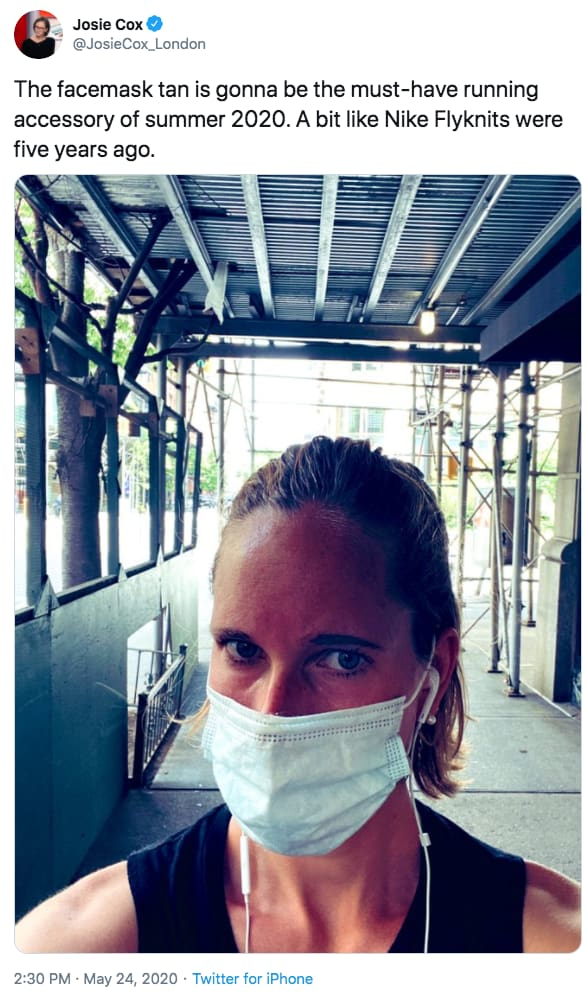Face Masks Bring Tan Lines and "Maskne" in Summer 2020
Survey Shows 20% of Americans Concerned About Getting Face Mask Tan Lines
Updated June 30, 2020
July Fourth weekend is typically a time for unveiling one's beach body after months spent in tanning beds and gyms. But in 2020, people are worried about more than just their abs and thighs.
They're worried about face mask tan lines.
According to our survey of over 1,000 adults, about 1 in 5 Americans are concerned about getting a face mask tan.
2020 Face Mask Summer Fashion
Many beaches, such as those popular on Cape Cod in Massachusetts, require beachgoers to don face masks as part of their official re-opening.
And if Americans are going to wear face masks, some are going to do it in style. For example, the Trikini is a bikini with a matching face mask first developed by Italian swimwear brand Elexia Beachwear.
Nearly every designer, boutique, brand and even sports teams have followed suit with their own custom face mask designs. After all, if you have to wear a mask, you may as well look good doing it.

Avoiding the “Face Mask Face”
Tan lines are just one face mask worry to watch out for this summer. Here are five ways to avoid other types of “face mask face.”
Wash Your Face to Avoid “maskne”
“Maskne” is facial acne or irritation caused by a mask.
Face masks can be hot, sweaty, poorly ventilated and create pressure and friction on the skin. Take extra care to wash your face after wearing one for an extended period of time, especially under the hot sun.
Wash Your Face Mask
Face masks can collect residue from sunscreen, makeup, lotion and sweat, all of which can irritate or dry out the skin, clog pores or cause a breakout of acne.
Wash your mask with detergent and warm water and allow it to fully dry before wearing it again. The CDC recommends washing your mask after every use in the event that it absorbed any particles of the virus while you were out.
Apply some moisturizer before putting on your mask to help provide a layer of protection for your skin. But be mindful to wash the mask after wearing it so the moisturizer doesn’t get “caked on” the mask.
Wear Cotton Masks
Synthetic materials such as polyester, nylon and rayon retain more heat and are therefore more likely to cause irritation of the skin.
Go for a face mask that is 100% cotton to allow for better air circulation.
Protect the Rest of Your Face
The best way to avoid a face mask tan? Protect the rest of your face from overexposure.
Try doubling up on the SPF you use for the rest of your face, or keep your face out of the sun entirely with a hat, large sunglasses or umbrella. You can also wear a bandana-style mask or even a full face mask to better avoid tan lines.
Tighten the Fit to Reduce Glasses Fog
You may have noticed your glasses tend to fog up while you’re wearing a mask. That’s because the warm air you exhale escapes through the top of the mask and goes up under your glasses.
To reduce the fog on your glasses, tighten the seal on your mask or wear it higher on your face.
Methodology
This survey was conducted May 6, 2020, using an audience pool gathered using Prolific, a polling tool. The total survey side included 1,004 respondents.
Participants were filtered based on completion time and failure to follow written instructions within the survey.
Margin of error: +/- 4% (95% confidence interval)
This survey relies on self-reported data.
Fair Use Statement
Of course we would love for you to share our work with others. We just ask that if you do, please grant us the proper citation with a link to this study so that we may be given credit for our efforts.
Research and reports
Our research reports analyze a number of issues important to seniors, from health perceptions, medical communication, health habits, and more.





